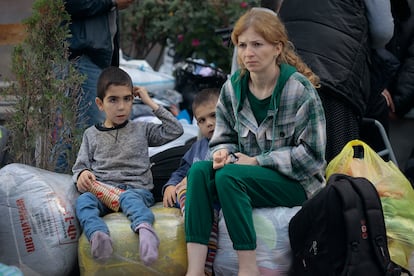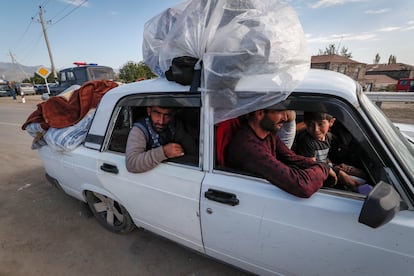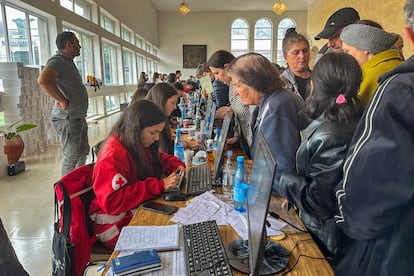The flight of Armenians from Nagorno-Karabakh: ‘We left a whole life behind’
More than 70% of the population has left the Azerbaijani break-away region since September 24 after Azerbaijani forces seized control


What do you take from the place where you were born, where you grew up and put down roots, when you know you will not be back? How much of a life can you fit into a couple of raffia bags? This is the snap decision that tens of thousands of Armenians have had to make before fleeing Nagorno-Karabakh, an Armenian enclave and unrecognized republic on Azerbaijani soil mired in a decades-long conflict. According to official Armenian figures, more than 84,000 people — or 70% of the region’s population — have crossed the border since Sunday, September 24, when the Azerbaijani authorities seized control of the area last week and embarked on a process of what has been termed ethnic cleansing.
The luggage piles up next to the modest replica of the Eiffel Tower in Goris Memorial Park in southeastern Armenia. Vans carrying refugees come and go, NGO tents multiply, and high school kids hand out food, clothes, diapers, and medicine. Elena — not her real name — holds her baby tightly with one hand, while trying to grab bags of food with the other. “It’s very hard,” she says. “Everything we have built over a lifetime has been left behind.” Her cheeks and eyes redden, and she begins to cry. She stops talking. She can’t.
“I didn’t bring anything with me,” says Yeram Sakarian, holding up his windbreaker. “I don’t have anything! Only my passport and my documents.” This tractor and agricultural machinery mechanic lived in Taghavard, a village in eastern Nagorno. Faced with the advance of the troops, the mayor ordered the evacuation of the village’s inhabitants, who are now gradually arriving in Armenia. But very gradually. The Lachin corridor — the road that connects the enclave with Armenia — is one big traffic jam over 40 miles long. It took Sakarian two days to get through and, in the chaos, he was separated from his children, whom he expects to arrive in Goris in the next few hours or days. “When they arrive, we will decide what to do; we don’t know what will become of us,” he says. “Right now, everything is uncertain.”
Hundreds of vehicles leave Goris every hour carrying refugees to the Armenian capital, Yerevan, as well as other Armenian towns and cities. They are private vehicles — vans, buses, and cabs manned by volunteers.
Arkadi Abrahamian is waiting for a ride in one of these vehicles. It is not the first time he has had to go into exile: during the 2020 war, Azerbaijan took control of the village where he lived, and he had to escape to Stepanakert, the Karabakh capital, where his family of nine squeezed into a rented apartment. There they tried to rebuild their lives, which they have now dismantled once again and repacked into a couple of bags. Abrahamian was an officer in the Defense Army — the name the Karabakhis gave to their Armed Forces — but, after more than 30 years of conflict, he no longer wants to fight: “I am fed up and tired,” he says. “I don’t want to serve in an army anymore. I would like to live in my homeland, but not under Azerbaijani rule. I don’t know what will happen now. We will probably leave Armenia too, maybe for Russia.”

The Armenian government has set up a system to register refugees from Nagorno-Karabakh, although they all possess Armenian passports. It first set up the registration center in Kornidzor, the first town across the border, but the flow of refugees was overwhelming, so the center was moved to the theater in Goris. A second registration point has now been opened at the culture center in Vayk, 60 miles further inland, to avoid further bottlenecks.
Of the 70,000 refugees, the Armenian state has found accommodation for 14,000. The rest are staying in hotels or in the homes of friends and relatives. “In Goris, there is no more accommodation, and they don’t want to stay here either, because it is a province bordering Azerbaijan,” explains Armine Avakyan from the provincial governor’s office. “Another solution would be for them to go to the villages where there are many empty houses, but they are also in the border area, and they are afraid.”
The inside of the theater smells of sweat and defeat. It is filled with the tanned faces of mountain dwellers, many missing teeth and making circumspect gestures. They stand in line to register and ask for their loved ones. An employee with the International Committee of the Red Cross takes down the names and addresses of those who are looking for relatives lost in the chaos of the Azerbaijani offensive and the consequent evacuations. It is a chaos that has been compounded by the explosion at a fuel distribution center last Monday, which left dozens dead and hundreds injured.

Susana lost contact with her children because when Azerbaijan began shelling the Nagorno-Karabakh enclave, she was in her parents’ village, which came under siege. After a few days, Russian peacekeepers escorted her and the villagers out in trucks. Only when she arrived in Armenia was she reunited with her children and the rest of her family, though she learned that her brother had been killed in the explosion at the fuel distribution center: “My mother is hospitalized because she started to feel sick during the evacuation, but we haven’t told her yet that her son is dead,” says Susana. “She thinks he only has some burns.”
According to Raya Avakyan, “There are no words to describe what it feels like to know that you will not return, but everyone is leaving Nagorno-Karabakh. You can’t sleep when there is only fear in your heart. We don’t know where we will go.” Right now, Raya is going to Yerevan because her brother-in-law is hospitalized there. He was queuing at the distribution center to fill up his car and escape from the enclave at the time of the explosion. “He is in a critical condition, on assisted ventilation,” she adds. “We don’t know if he will survive. My sister has also been hospitalized here in Goris because she is pregnant, but the baby has stopped moving.”
Sign up for our weekly newsletter to get more English-language news coverage from EL PAÍS USA Edition
Tu suscripción se está usando en otro dispositivo
¿Quieres añadir otro usuario a tu suscripción?
Si continúas leyendo en este dispositivo, no se podrá leer en el otro.
FlechaTu suscripción se está usando en otro dispositivo y solo puedes acceder a EL PAÍS desde un dispositivo a la vez.
Si quieres compartir tu cuenta, cambia tu suscripción a la modalidad Premium, así podrás añadir otro usuario. Cada uno accederá con su propia cuenta de email, lo que os permitirá personalizar vuestra experiencia en EL PAÍS.
¿Tienes una suscripción de empresa? Accede aquí para contratar más cuentas.
En el caso de no saber quién está usando tu cuenta, te recomendamos cambiar tu contraseña aquí.
Si decides continuar compartiendo tu cuenta, este mensaje se mostrará en tu dispositivo y en el de la otra persona que está usando tu cuenta de forma indefinida, afectando a tu experiencia de lectura. Puedes consultar aquí los términos y condiciones de la suscripción digital.








































